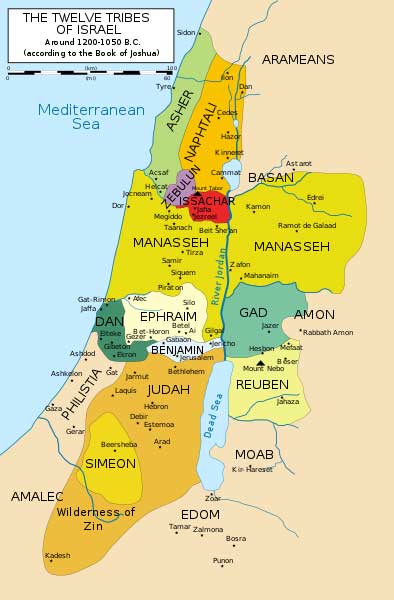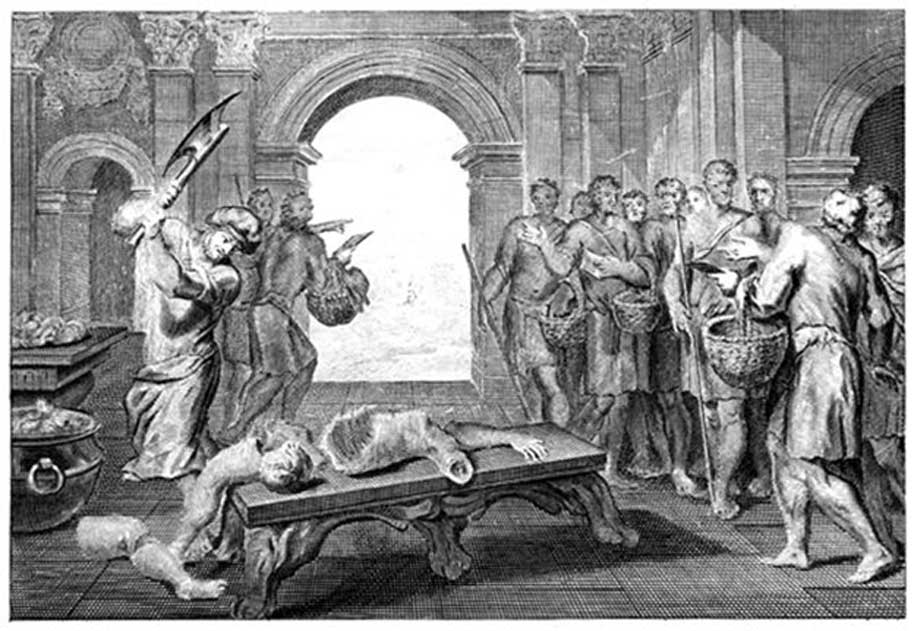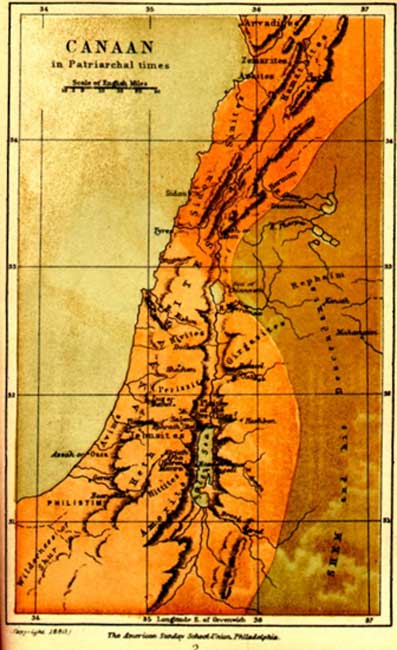
The Gibeah Incident: Ancient Israel’s First Civil War Over a Concubine
The first civil war among the tribes of Israel broke out over the Gibeah incident, which was between the Israelite confederation and the tribe of Benjamin. While this incident is normally placed towards the end of the book of Judges, Chapters 19-21, the incident may have taken place much earlier - perhaps after the death of Othniel during the 40 years of peace, from external threats. Therefore, the incident at Gibeah should be placed in Judges 3 between the time of Othniel and Ehud. The argument for this placement is due to Judges 20:28 mentioning one ‘Phinehas, the son of Eleazar, the son of Aaron,’ who participated in the battle, which is the same Phinehas that is mentioned in Exodus 6:25 and much so during the remaining last few decades of Moses’ life and during Joshua’s entire reign. Phinehas could not have lived that long, as he would have been well over 150 years old.

Twelve Tribes of Israel (CC BY-SA 3.0)
Decline of the Unity of the 12 Tribes
To understand how this civil war came about one must first look at its causes, long before the incident took place. The first clue to understanding the ensuing civil war, is an inspection as to how the tribes of Israel went from unification to collapse, and it begins with the era of Joshua. “And when Joshua had let the people go, the children of Israel went every man unto his inheritance to possess the land.” The Israelite army was still fundamentally intact, even after the death of Joshua and with a new generation in charge. But as one generation passes down authority, a new generation rises to the challenge, and it was this new generation that ultimately and unknowingly collapsed the Israelite military system. While the Israelites knew that they were related ethnically, they had gradually grown apart and decided it was to their economic benefit to live in peace with the Canaanites. In doing so, like all families over time, they become distant and unknowing to one another; they were related, but only in name. This explains, if one is familiar with the story of Othniel and the many judges to come after these events, why one rarely reads of Israel uniting and fully mobilizing for war. But Israel would unite over an incident involving a Levite and his concubine.
Rape of the Levite’s Wife
The story begins with a certain Levite who lived in the hills of Ephraim and took a concubine from Bethlehem. However, she felt indifferent and left him, moving back to her parents’ house in Bethlehem, Judah. The Levite went to retrieve his wife and stayed at her parents’ house for some time before moving on. Once on the move, they decided to stay in the Benjamite town of Gibeah. Arriving late one night, an old man took the couple in. Later that night, the men of the town pounded on the door, demanding that the owner of the house introduce the Levite to them, so that they could have sexual relations with him. The old man of the house refused but offered his virgin daughter and the Levite’s concubine in exchange. To spare the virgin daughter of his host, the Levite sent his concubine out and the Benjamites raped and abused her the entire night long. By morning, she scarcely made her way back to the house where her master stayed before she died. The Levite then: “loaded her body on the donkey and began his trip home. On arrival at his house, he got a knife, took hold of his concubine’s body, cut her up into twelve pieces, and sent them to all the regions of Israel.” The tale of the brutal rape shocked the whole of Israel, and its impact united the tribes against the house of Benjamin.

Levite cuts his concubine by Otto Elliger (Public Domain)
Declaration of War Against the Benjamites
After some deliberation, the tribal leaders of Israel journeyed to Mizpah and requested that the Levite come forth and testify before the assembly. The Levite shared his grim report and, after he was done, asked the assembly their verdict. It was unanimous; the tribes were all committed to bring about justice. The tribal leaders went back to their respective tribes, assembled their forces, gathered provisions, and sent word to the tribe of Benjamin to: “deliver us the men, the children of Belial, which are in Gibeah, that we may put them to death, and put away evil from Israel.” Benjamin’s tribal leader got word of the message and sent no reply. Instead, he ordered that the warriors of Benjamin to gather: “themselves together out of the cities unto Gibeah, to go out to battle against the children of Israel.” Once the message was received, 26 sword-bearing contingents converged on Gibeah along with 700 elite warriors, who: “could sling stones at a hair’s breadth, and not miss.” As Benjamin dug in at Gibeah, the Israelites mobilized their troops and coalesced into a force of 400 sword-bearing contingents. They marched to Bethel: “the house of God, and asked counsel of God, and said, Which of us shall go up first to the battle against the children of Benjamin?” After much consideration and prayer, Phinehas, the High Priest, came forth before the Israelite army and said that the Lord chose Judah to go first into battle. It was not Yahweh who selected Judah to go into battle first, but the fact that Judah had a much larger army than the other tribes.
- Sounding the Horns of Doom at the Battle of Jericho – Part I
- The Missing Contents of the Ark of the Covenant: What Was Inside the Ark? (HINT: Not just the 10 Commandments)
- The Battle of Mount Gilboa: King Saul’s Defeat and Death
The next morning, the Israelite forces moved out towards Gibeah, where they encamped outside the city. After the officers reviewed their battle plan, the Israelite forces mustered into battle array. As the Israelite forces got into formation, so, too did the tribe of Benjamin. However, Benjamin was no fool; they stayed close to the city, for the city provided them protection. The Israelites’ battle strategy was that a frontal assault, a war of attrition, should break the Benjamites’ will.






